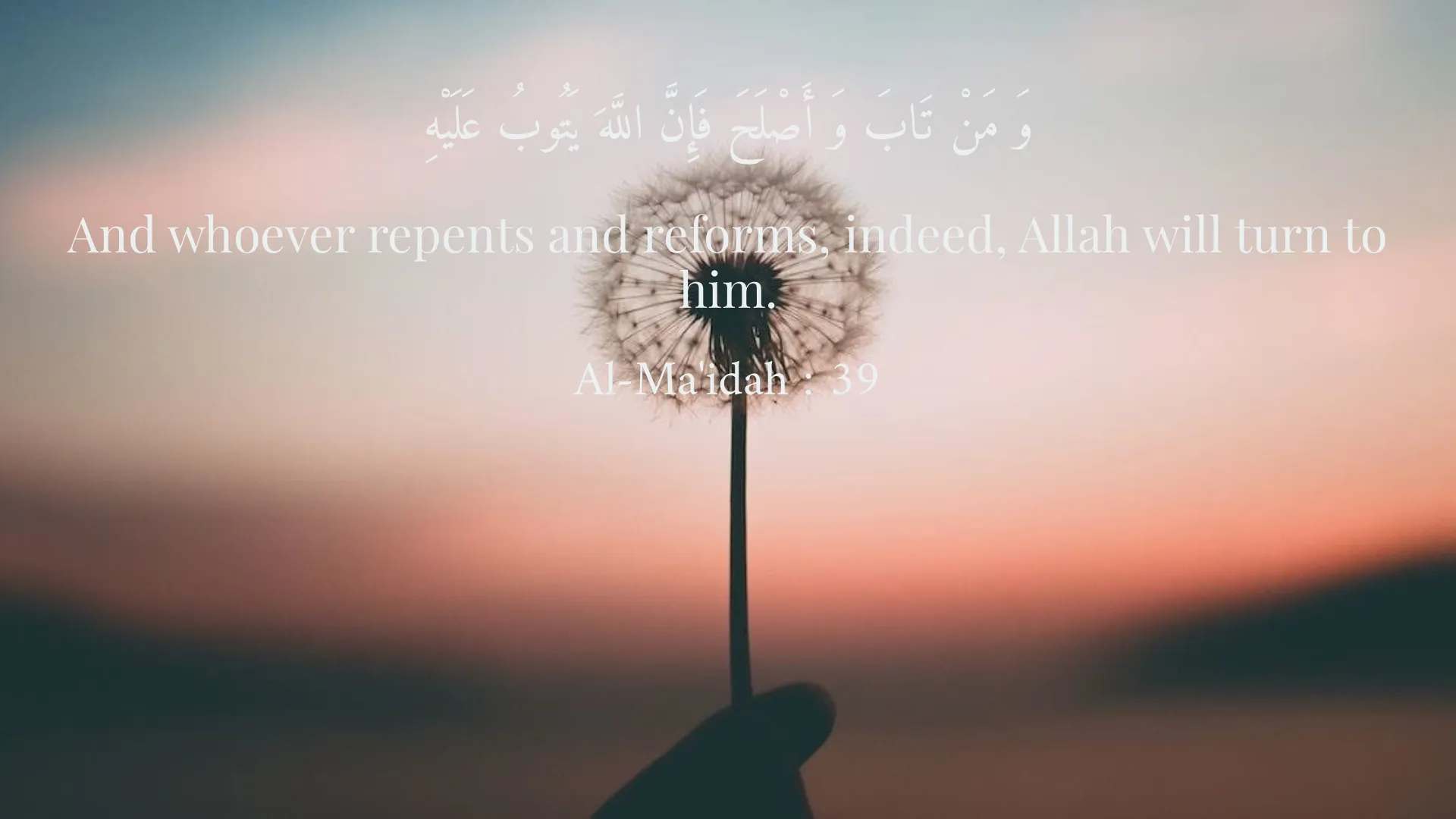Quranic Answer

The concept of forgiveness holds a revered position in the spiritual teachings of Islam, especially as articulated within the Holy Quran. Central to the faith is the belief in Allah's boundless mercy and readiness to forgive those who sincerely seek repentance. The Quran emphasizes that no sin is too great for Allah's mercy, encouraging believers to turn back to their Lord with a heart full of remorse and a genuine intention to reform. This article delves into the profound meanings embedded in various Quranic verses that highlight the themes of repentance, forgiveness, and personal transformation, underlining that the path to forgiveness is an essential journey for every believer. One of the most impactful verses regarding forgiveness is found in Surah Al-Ma'idah, verse 39: 'And whoever repents and reforms, indeed, Allah will turn to him.' This verse is particularly significant as it encapsulates the core message of hope and redemption in Islam. It reassures believers that regardless of their past mistakes, as long as they genuinely repent and seek to amend their behavior, Allah's compassion is readily available to them. The act of repentance, or 'Tawbah,' is not merely a verbal expression of regret; it requires sincere inner change and a commitment to live righteously moving forward. Furthermore, repentance is often linked to the desire for self-improvement, which is profoundly stressed throughout Islamic teachings. The act of turning away from sin is not isolated but rather signifies a transformative process that encompasses both the heart and the actions of an individual. One who truly engages in this process is investing in their personal development and moving closer to the ideal of a life that pleases Allah. This transformation and reform lead to a renewed sense of purpose and fulfillment, cultivating attributes such as humility, kindness, and resilience. In Surah Az-Zumar, verse 53, we find another profound reminder of Allah's mercy: 'O My servants who have believed, fear your Lord. For those who do good in this world is good, and the earth of Allah is spacious.' This passage serves to reinforce the notion that those who are dedicated to doing good and avoiding the path of wrongdoing are the ones favored by Allah. It underscores the importance of holding onto faith, fostering hope in God's mercy, and actively striving to do good deeds that contribute to the well-being of oneself and others. Moreover, Surah Al-Furqan, verse 70, states: 'Except for those who repent, believe and do righteous work,' further elucidating the intertwining of repentance with faith and action. This verse makes it evident that to attain forgiveness, one must couple their sincere repentance with a belief in Allah and an earnest commitment to righteous actions. The teaching enshrined in these verses highlights that while seeking forgiveness is a personal journey, it is also a communal one; believers are encouraged to support one another in their quests for betterment. From a spiritual perspective, the experience of seeking forgiveness is often accompanied by a notable transformation in one's emotional state. Many believers describe experiencing a sense of peace and lightness as they engage in sincere prayer and reflection following acts of repentance. The burdens of guilt and regret seem to lift, replaced by feelings of tranquility that come from having submitted oneself to Allah's will. This emotional liberation is indicative of a transformative journey, as one acknowledges their past transgressions, seeks forgiveness, and resolves to forge a better path ahead. The spiritual dynamics of forgiveness also intertwine with the notion of mercy. Allah's mercy is emphasized in numerous verses, providing believers with the reassurance that their misdeeds do not preclude them from receiving His kindness and understanding. This profound idea invites individuals to adopt a mindset that prioritizes compassion, both towards themselves and others. In practicing forgiveness—whether it is self-forgiveness for one's past actions or forgiving others—believers cultivate an environment of empathy, which is essential in community building and promoting healing. Continuous prayer, reflection, and self-improvement contribute significantly to deepening one's faith and reinforcing the belief that one can always return to Allah regardless of their past. Engaging in regular Salah (prayer), reciting Quranic verses, and participating in supplications during times of need are not only acts of devotion but also integral to the process of unburdening the heart. By participating in these acts, believers draw nearer to their Creator, reinforcing their commitment to righteousness and providing them with a sense of connection and belonging within a greater community of believers. To summarize, the Quran provides profound insights into the nature of forgiveness, emphasizing that repentance is a multi-faceted journey that encompasses change in heart, belief, and righteous action. Allah’s promise of mercy signifies hope for every believer and serves as a testament to the transformative power of turning back to one’s Lord. Through genuine repentance, a belief in Allah's infinite mercy, and the endeavor for continuous improvement, believers can gain the assurance of Allah's forgiveness. Thus, seeking improvement and nurturing faith through prayer and good deeds not only benefits the individual, but ultimately enriches the entire community, fostering an atmosphere of compassion, understanding, and shared growth.
Related Verses
وَ مَنْ تَابَ وَ أَصْلَحَ فَإِنَّ اللَّهَ يَتُوبُ عَلَيْهِ
And whoever repents and reforms, indeed, Allah will turn to him.
Al-Ma'idah : 39
يَا عِبَادِيَ الَّذِينَ آمَنتُمْ اتَّقُوا رَبَّكُمْ ۖ لِلَّذِينَ أَحْسَنُوا فِي هَذِهِ الدُّنْيَا حَسَنَةٌ
O My servants who have believed, fear your Lord. For those who do good in this world is good.
Az-Zumar : 53
إِلَّا مَنْ تَابَ وَ آمَنَ وَ عَمِلَ عَمَلًا صَالِحًا
Except for those who repent, believe and do righteous work.
Al-Furqan : 70
Short Story
One day, Hassan pondered whether his sins had been forgiven. He reflected on the Quranic verses and decided to focus on repentance and self-improvement. Every day he engaged in prayer and sought forgiveness, and he began to feel a sense of peace in his heart. Gradually, he felt a heavy burden lift off his shoulders, and it became clear to him that Allah had shown him mercy.